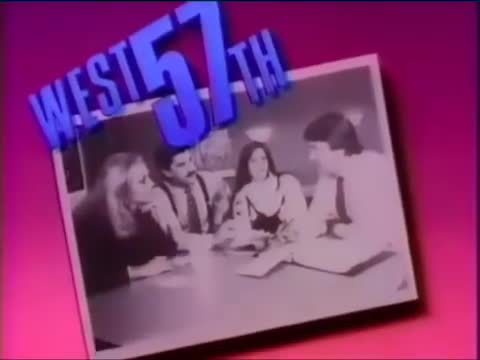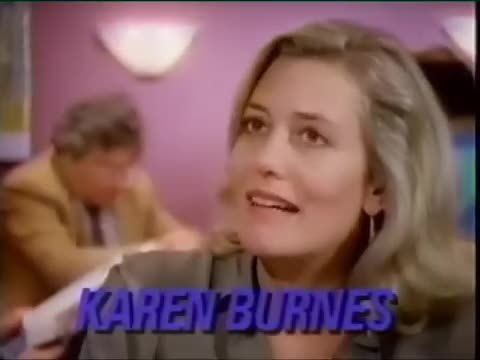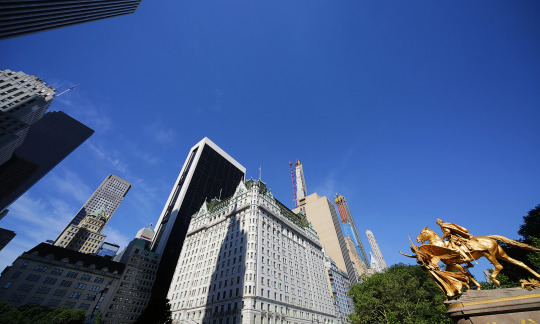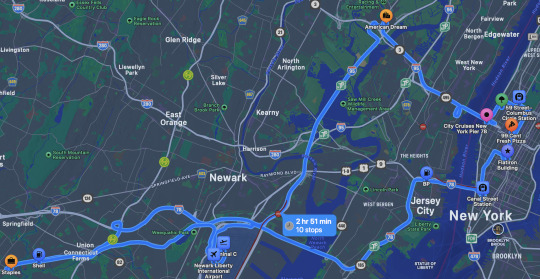#West 57th
Explore tagged Tumblr posts
Text






West 57th - CBS - August 13, 1985 - September 9, 1989
Newsmagazine (??? Episodes)
Running Time: 60 minutes
Stars:
Meredith Vieira
John Ferrugia
Jane Wallace (1985–1988)
Bob Sirott (1985–1988)
Karen Burnes (1988–1989)
Selina Scott (1987–1988)
Steve Kroft (1987–1989)
Stephen Schiff (1988–1989)
0 notes
Video
youtube
LECTURE 7: MEET THE BEATLES (PART 2): Back in the 1980s, the American television network CBS had a popular newsmagazine program called West 57th, which was sort of like 60 Minutes for younger, hipper people. West 57th ran from 1985 to 1989. One of the segments on one of the episodes profiled George Harrison, who was interviewed by West 57th correspondent (and fellow Brit) Selina Scott in October 1987 for an episode that aired on December 12, 1987. The episode offers a fascinating glimpse at Harrison later in his career, yet it also touches on his distinctive personality traits that made him . . . well, George Harrison. His intense shyness, his aversion to public attention, and his reclusive nature are all on full display here. There is a reason why Harrison was nicknamed “the Quiet Beatle” back in the heyday of Beatlemania. His natural reclusiveness dates back to his childhood. What makes this interview all the more fascinating is that Harrison – as Selina Scott points out – so seldom granted interviews. I urge you to watch this interview from beginning to end. It is a compelling snapshot of a shy man.
#George Harrison#interviews#television#West 57th#CBS#1987#Selina Scott#recluses#shyness#The Quiet Beatle
0 notes
Text
My favorite piece of Bruce Springsteen lore is he wrote a beautiful, eloquent, 7 min long song about two star-crossed lovers where the man is a shady white dude and the woman is a beautiful Puerto Rican and then people were like "bestie, that's West Side Story" and he was like whAT
14 notes
·
View notes
Text

Fifth Avenue / Central Park South - 59th Street
Grand Army Plaza, Central Park Southeast corner, who consists of two symmetrical plazas bisected by 59th Street. On the southern side stands the (Pulitzer Fountain) and on the northern side is the gilded monument to Union General William Tecumseh Sherman.
(Plaza Hotel Behind The Solow Building. Far Right: 220 Central Park South. Tallest construction: The Steinway Tower at 111 West 57th Street. Blue&Orange Construction: Central Park Tower: The Nordstrom Tower at 217 West 57th Street.)
#5th Avenue#William Tecumseh Sherman#sculpture#59th Street#Fith Avenue#58th and 60th Streets#58th Street#60th Street#Plaza Hotel#New York#220 Central Park South#111 West 57th Street#Steinway Tower#Central Park Tower#Nordstrom Tower#217 West 57th Street#Solow Building#9 West 57th Street#luxury#Billionaires Row#2019#constructions#NYC
2 notes
·
View notes
Text
We’re living through the birth of a new species of skyscraper that not even architects and engineers saw coming. After 9/11, experts concluded that skyscrapers were finished. Tall buildings that were in the works got scaled down or canceled on the assumption that soaring towers were too risky to be built or occupied. “There were all sorts of symposiums and public statements that we’re never going to build tall again,” one former architect told The Guardian in 2021. “All we’ve done in the 20 years since is build even taller.”
There are skyscrapers, and then there are supertalls, often defined as buildings more than 300 meters in height, but better known as the cloud-puncturing sci-fi towers that look like digital renderings, even when you’re staring at them from the sidewalk. First supertalls were impossible, then a rarity. Now they’re all over the place. In 2019 alone, developers added more supertalls than had existed prior to the year 2000; there are now a couple hundred worldwide, including Dubai’s 163-story Burj Khalifa (a hypodermic needle aimed at space), Tianjin’s 97-floor CTF Finance Centre (reminiscent of a drill bit boring the clouds), and, encroaching on my sky, Manhattan’s 84-floor Steinway Tower (a luxury condominium resembling the love child of a dustbuster and a Mach3 razor).
Some supertalls have an even more futuristic designation: superslim. These buildings are alternately described as “needle towers” or “toothpick skyscrapers” (though not every superslim is a supertall). Early superslims shot up in Hong Kong in the 1970s, though lately they’ve become synonymous with New York City; four supertall superslims loom over the southern end of Central Park in a stretch of Midtown dubbed “Billionaires’ Row.” Building engineers, like judgy modeling agents, have varying definitions of superslim, but they usually agree that such buildings must have a height-to-width ratio of at least 10 to 1. To put that in perspective, the Empire State Building (one of the world’s first supertalls, completed in 1931) is about three times taller than it is wide—“pudgy,” as one engineer described it to me. Steinway Tower is 24 times taller than it is wide—nearly as slim as a No. 2 pencil, and the skinniest supertall in the world. (The developer’s official name for the building is 111 West 57th Street.) These superslim buildings—and supertalls generally—have relied on engineering breakthroughs to combat the perilous physics that go with height. A 2021 article in the journal Civil Engineering and Architecture declared: “There is no doubt that super-tall, slender buildings are the most technologically advanced constructions in the world.”
— The Marvels—And Mistakes—Of Supertall Skyscrapers
#bianca bosker#the marvels—and mistakes—of supertall skyscrapers#history#architecture#engineering#united arab emirates#china#usa#hong kong#dubai#tianjin#new york#new york city#manhattan#burj khalifa#tianjin ctf finance centre#111 west 57th street#empire state building#skyscrapers#supertall buildings#pencil towers
1 note
·
View note
Text
youtube
Ritz Thrift Shop commercial
#1970s#commercials#ritz thrift shop#nyc#new york city#west 57th street#thrift shop#thrifting#video#furs#youtube
0 notes
Text
ok so considering im decently sure a good chunk of the f1 drivers dont actually like driving road cars on roads (fair) i propose a new grand prix to determine the real Best Driver.
behold. the rush hour grand prix.
1 lap. at rush hour on a friday night. all the usual normal commuters and terrible drivers are still on the road along with all the drivers. in the rain. everyone drives a car of their choice. they have to count out all their tolls using change, no one gets ez pass. and you get disqualified if you veer from the instructions (no wrong turns!)
and where does this take place?
thats right.
new jersey. (and new york city) (but mostly new jersey)
here is the proposed track:

we start and end on route 22 right outside the staples. a terrible awful road that would cause harm to any driver, especially european ones. route 22 is so terrible because there is a long stretch that has a center median with shops in it, so theres shops on the right the left and in the center with u turns every 500 feet.
they go east on 22 towards us route 1 and 9 and, thats right, newark liberty international airport. here they have to do a loop around all of the departure terminals before exiting and heading towards jersey city on route 78.
they take route 78 through the holland tunnel, which is a hilarious tunnel to go through as you can literally blink and miss the signs because theyre so small.
upon arriving in new york city they will head towards the canal street station, doing an awful little loopy loop to take hudson street to 8th avenue. new york will prove a challenge for many of them because every other street and avenue there is pretty much a one way in the opposite way.
theyre going to turn right on 23rd street and take it three blocks towards the flatiron building on fifth avenue before doing another turn around and heading back up sixth avenue
here theyre going to turn left on 40th street, then right on 7th avenue then immediately right again on 41st street and then back to 6th avenue which they'll take all the way to the bottom of central park. here they'll turn left onto 59th street then go around columbus circle, exiting on broadway and then going right onto 57th street, which they'll then take down to 11th avenue, then after. few blocks cut over to the west side highway (12 avenue) and then they'll get off at 40th street and enter, you guessed it, the lincoln tunnel.
they'll exit the lincoln and get onto route 3 which they'll take down to route 120 and then they'll do a single doughnut in the parking lot at the american dream mall (a terrible place) before getting onto, you guessed it! 95!! they'll take 95 (devil highway) to 78 to the garden state parkway before getting back on route 22, doing a quick hairpin turn at one the first u turn and then end up straight back where they started. outside the staples.
i think maybe 3 people would finish the whole thing. logan sargeant, being the only american, would come in first. fernando alonso takes second and valtteri bottas takes third.
728 notes
·
View notes
Text
"The problem with John and Paul was that they were so busy being…John and Paul, that they failed to notice who else was around at the time."
-George Harrison (West 57th St interview, 1987)

247 notes
·
View notes
Text

Letter from the National American Women Suffrage Association to Senator Charles Dick
Record Group 46: Records of the U.S. SenateSeries: Petitions and Related Documents That Were Presented, Read, or TabledFile Unit: Petitions and Memorials, Resolutions of State Legislatures, and Related Documents Which Were Tabled
[handwritten] Harriet Taylor Upton
National American Woman Suffrage Association.
MEMBER NATIONAL COUNCIL OF WOMEN.
Honorary President, Susan B. Anthony, 17 Madison Street, Rochester, N.Y.
[handwritten] 4
President, REV. ANNA HOWARD SHAW,
7443 Devon Street, Mt. Airy, Philadelphia, Pa.
Vice President at Large, CARRIE CHAPMAN CATT,
205 West 57th Street, New York City.
Corresponding Secretary, KATE M. GORDON,
1800 Pyrtania Street, New Orleans, La.
Recording Secretary, ALICE STONE BLACKWELL, 3 Park Street, Boston Mass.
Treasurer, HAPRIET TAYLOR UPTON [handwritten circle around name], Warren, Ohio.
Auditors {LAURA CLAY, Lexington, Ky.
CORA SMITH EATON, M.D., Masonic Temple, Minneapolis, Minn.
National Press Committee, ELNORA M. BABCOCK, Dunkirk, N.Y.
NATIONAL HEADQUARTERS, WARREN, OHIO. Nov. 17, 1904.
[stamp/seal partially illegible]
...grahical
UNION LABEL 2
...
Hon. Chas. Dick,
Akron, Ohio.
My dear sir;-
Well, now that the election is over and that
it was as much of a surprise to you as to any of us laymen,
I hope you can and will give your attention to a matter
about which I am writing. Please use our influence to have
the [begin handwritten underline] Territorial Committee strike out either the word sex [end handwritten underline]
in the clause of the Statehood Bill which classes women with
criminals and lunatics, or the whole paragraph. Some people
say if the word sex is stricken out it will foce the Ter
-ritories to consider the question of woman suffrage. Of
course I should not mourn if this were done, but I am not
asking the Territorial Committee to do anything so radical.
Territories have been admitted in the past without any such
clause, and, although it is true that we are politically
classed just this way, somehow it looks a little worse when
we see it in black and white. It is wonderful how stirred
up the conservative women, the club women, woman of missio-
ary societies and all that are over this action. I know
that if you reply to me that you will give this matter your
attention, you will do so. I am therefore not sending any
words in pressing you or in presenting any arguments to you.
Nobody knows better than you do that women of the great
southwest deserve something better than this classification.
Most truly yours,
[handwritten signature]
Harriet Taylor Upton
183 notes
·
View notes
Text
Infinity Falls Lore
First work is establishing the change in the timeline, Stan still getting kicked out after Pa found out about the project and Ford leaving with him.
Ford goes to his dream school (West Coast Tech), but he cuts off all contact with his father and mother, Stan only keeping in touch with Shermie. Ford is only close to Stan, though he doesn't dislike Shermie, who was absent for most of their childhood.
The Northwest family are the founders of Gravity Falls, but the community practically worships the Pines family, who discovered the strange and unexplainable, putting Gravity Falls, Oregon on the map for many tourists. So the Northwest’s moved out of pettiness that they were no longer the center of attention in Gravity Falls after the Stan twins and Fiddleford came into the picture.
Fiddleford is Ford's lab partner, having moved his family to Gravity Falls permanently so he could continue his research. Fiddleford and Ford are teaching Stan the basics of building since Stan wanted to bond with his brother more by showing interest in Ford's passion. The three of them are inseparable.
Stan had unofficially adopted Soos as a kid, raising him as his own and adding him to the family roster when he turned 18 as a birthday present (Jesus Alzamirano Pines-Ramirez). Soos works in the Mystery Shack (Stan had named it lol), where they display actual creatures and cursed objects for people to gawk at. Soos is in charge of looking after the place with Tate, Wendy, her gang, and Fiddleford when Stan and Ford go sailing for the year (returning to Gravity Falls before summer in order to get ready for the kids).
Mystery Shack had renovations done to make the display room and the gift shop bigger, also fortifying the display room so it could be locked down when the Shack closed. The reason that the Mystery Shack isn’t in a different location is just in case anything happens (like the anomalies breaking out), all the experts are literally in the adjoining house.
The reason why the Northwest's return to Gravity Falls is because Ford wants to make the Mystery Shack known as the ‘eighth wonder of the world’ as a gift to his brother on his 57th birthday. Ford has more legal contacts in his pocket than Stan and puts them to use by offering to conduct business with the influential Northwest family in return for this favor. Ford chose them because he knows Preston would be easy to manipulate and keep in line. Plus, Ford has other plans for him too.
Ford is working on building the portal with Fiddleford and Stan (Dipper helping with the equations but none of the actual building since it was dangerous), Stan sweet-talking Preston into being business partners with them when Ford has no intention of letting the Northwest family take any credit or glory for his family’s achievements. But Ford knows that the Northwest name can be used as a social shield and a potential fall guy if things go to shit.
Preston and his wife are trying to match Pacifica with Dipper to worm their way into the family since Pines look out for their own, acting as a unit. Pines are fiercely loyal to those they consider theirs. Mabel has Waddles, Candy, Grenda, and Robbie while Dipper has Wendy and Tate (Dipper is less inclined toward people than Mabel). Soos is more emotionally attached to Stan and the kids, but he respects Ford and Fiddleford.
Gideon is an amateur explorer of the weird and unexplainable, interested in Stan’s work and constantly trying to either bribe or trick Stan into taking him on as an apprentice. Stan has no interest in letting Gideon see the inner workings of how they successfully capture/tame the creatures that call Gravity Falls home. He knows a power hungry, greedy, backstabbing little rat when he sees one.
Gideon also has an entirely one-sided crush on Mabel, who is completely dismissive of him. Still, Gideon is persistent, convinced that the reason she won’t date him is because of her family. When things escalate as Gideon goes after Dipper with what little magic he was able to learn, Mabel makes it very clear that hurting her brother is unforgivable. Stan makes sure Gideon is tried as an adult and put away for premeditated, attempted murder.

#gravity falls#infinity falls au#lore#stan pines#ford pines#dipper pines#mabel pines#pines family#fiddleford mcgucket#soos ramirez
70 notes
·
View notes
Text
111 West 57th Street is a residential skyscraper in Midtown Manhattan, New York City, constructed between 2015 and 2021. Also known as Steinway Tower, it is the fourth-tallest building in the United States at 1,428 feet (435 m) and the world’s thinnest skyscraper with a width-to-height ratio of about 1:24. Its 84 floors contain 60 luxury condominiums.
40.764550°, -73.977650°
Source imagery: Nearmap 3D
110 notes
·
View notes
Text
“I think there is a simpler explanation to the tragedy and the barbarism on October the 7th, which is that you cannot indefinitely contain a group of people under military occupation for decades and expect that there won't be violence. There is violence in the Middle East, and the root cause of that violence is an illegal military occupation that is now in what, it's 57th year in the occupied West Bank and Gaza. And this is not just me saying this.
I mean, people like General Shlomo Brom, one of Israel's most famous military strategists, says, the oppressed will rise against the oppressor because it's absurd to hope that Israel can indefinitely contain with its military might millions of Palestinians who claim the right to a free, normal life. That is the statement of Shlomo Brom.
It's not true that the previous Gaza conflicts were all started by Hamas. Some were, but not all of them. Ceasefires have been broken on both sides and that's been well documented by multiple neutral observers and international observers.
But just on the broader point, Israel was never done with Gaza. This myth that they pulled out all the settlers and the occupation ended, first of all, under international law, Gaza is still occupied.
The Israelis control most of the land borders, all of the naval waters, all of the airspace. You tell me a country in the world that would accept that, any kind of country that you would call independent or sovereign. The Israelis even control the population register in Gaza, which means if you're born in Gaza, the Israelis are the ones who register you in control.
All of the information about your birth, life, and death. So this idea that Gaza was free, it was not free. And the boycott, the siege, I mean, it was not defensive.
Again, multiple human rights groups, including Israeli human rights groups like Gisha have said over the years, that the boycott was not defensive, that it was arbitrary, that it was cruel. Items like pasta, coriander, right? These are items that were banned at certain points going into Gaza.
Even now, David Miliband, the former British Foreign Minister, head of the International Rescue Committee, went on CNN this week to point out that dual-use items are being blocked going into Gaza. Entire aid trucks are being turned away because there's a scissors in them. A pair of scissors is inside a truck.
For medical purposes, the entire truck is turned away. For years now, the people in Gaza have been blockaded, besieged. The UN said it would be unlivable years ago.
We're now in 2024. It's certainly unlivable now. So no, I don't believe the Israeli narrative.
And one last thing, let's say everything Israel said was true. That still does not justify the collective punishment of 2.2 million people, half of whom are children, and who are now in the midst of one of the worst famines in living memory, according to the experts.
[…]
I've been very, very, very critical of Hamas. I've been critical of Hamas for decades. I've been critical of Hamas since October the 7th.
I was critical of Hamas on October the 7th. So no, I'm not sparing in my criticism of Hamas, but the missing context here, of course, is that we don't fund Hamas. I'm not responsible for Hamas.
I am responsible for the famine in Gaza. I am responsible for the killing of 30,000 people in Gaza because my taxes paid for it. The United States government is funding one side of this conflict.
The United States does not fund Hamas, last time I checked. So this idea that we are either fund them or protect them with a UN veto or arm Hamas, I don't think we send arms to Hamas, we do to Israel. Therefore, that is the focus of my journalism.
And by the way, yes, the focus of my journalism right now is on criticism of Israel because the rest of the US media has completely failed on this issue, has dropped the ball. I mean, I can go through The New York Times, The Washington Post, and show the exact opposite, pieces that are providing cover and safety for the Israeli narrative, including in absurd headlines where we go out of our way to use the passive voice and never cite that Israel is responsible for bombing a hospital or Israel is responsible for bombing a refugee camp. So I'm trying to do a little bit of correction on my end with this new media organization.
But look, Hamas is a brutal group. What it did on October the 7th was pure terror. They killed innocents, they abducted innocent babies as hostages into the war crime.
But none of that justifies what Israel is doing right now. And nor are we responsible for what Hamas is doing. But we are, in New York and across the country, sadly, we are responsible for the crimes that Israel is carrying out.
And that's the point I'm trying to make.”
—Mehdi Hasan
#politics#palestine#gaza#israel#mehdi hasan#hasbara#false narratives#false equivalencies#feigned neutrality#journalism fail#the media is complicit#october 7#october 7th#7 october
139 notes
·
View notes
Text

The Beatles at Suffolk Downs Racetrack in Boston, MA on August 18, 1966; photo by Harry Benson.
“You know, I think The Beatles were fantastic. John and Paul were fantastic. You see, the funny position I was in was that, in many ways, this whole focus of attention was on The Beatles, so in that respect I was part of it, but from being in them, an attitude came over which was John and Paul, of, ‘Okay, we’re the grooves, and you two just watch it.’ Not that — they never said that or did anything, but over a period of time….[…] [I]n a way I always felt a bit like an observer of The Beatles, even though I was with them, whereas I think John and Paul were the stars of The Beatles. I mean, on a very personal intimate level, you know – don’t forget I spent ten years in the back of a limousine with them.” - George Harrison, Rock Around The World interview, 1974 “We [George and Ringo] were the economy class Beatles. Some people thought so, anyway.” -George Harrison, Wogan, February 1988 Q: “In an interview before his death, John said he was really hurt by you, that you never mentioned in your biography any of the influence that he had on you.” George Harrison: “He was annoyed ‘cause I didn’t say that he’d written one line of this song ‘Taxman’. But I also didn’t say how I wrote two lines of ‘Come Together’ or three lines of ‘Eleanor Rigby’, you know. I wasn’t getting into any of that. I think, in the balance, I would have had more things to be niggled with him about than he would have had with me.” Q: “He said that you idolized him as a young boy.” GH: “That’s what he thought. I liked him very much. He was a groove. He was a good lad. But, at the same time, he misread me. He didn’t realize who I was, and this was one of the main faults of John and Paul. They were so busy being John and Paul, they failed to realize who else was around at the time.” - West 57th Street, 1987 (x)
#George Harrison#The Beatles#quote#quotes by George#Ringo Starr#John Lennon#Paul McCartney#George and fame#Harrison contributions
183 notes
·
View notes
Text

West 57th Street:
Right Up from Down
Central Park Tower (Nordstrom Tower) (Construction)
One57 (Middle Blue Skyscraper)
165 West 57th: St IESE BusinessSchool.
The Briarcliff 171 West 57th Street
111 West 57th (Construction)
Left :Up from Down
142 West 57th Street (Blue)
Carnegie Hall Tower (Bricks)
888 West 7th Avenue (Green)
(Shot 2019)
#111 West 57th#One57#HiltonClub#Central Park Tower#St IESE BusinessSchool#142 West 57th Street#The Briarcliff#Nordstrom Tower#Carnegie Hall Tower
0 notes
Text

Pool It! was released in August 1987.
“The inspiration [for 'Gettin' In,' which will be explored in more detail later this year as part of a series on this fan page] came to me on West 57th Street one day. I don’t remember the initial form of the piece, but I was charged. I immediately started to make a demo on a dinky little four-track. I had one little synthesizer, it was Casio’s first. It was a genuine synthesizer in that it had an ADSR generator and a primitive sequencer. The reason the bass goes the way it does is that I couldn’t get any lower notes on the keyboard, that’s where it stopped!” - Peter Tork, Listen To The Band liner notes, 1991 Also featured with Peter on lead vocal: “Since You Went Away,” written by Michael Levine. “‘Somebody told me one of the songs sounds like heavy metal,’ Tork said with a laugh. ‘I said, “No it’s just a rave-up rocker.” People think if the Monkees don’t have tambourine and heavy acoustic guitar records, then we’ve abandoned our roots. If it’s a synthesizer, it can’t be the Monkees anymore. ‘To my ears, it sounds like a good, modern record. It’s not very adventurous, not very ferocious or rough. It’s a decent, middle of the road, good pop record.’” - Detroit Free Press, August 24, 1987 “Peter Tork was an amazing multi-instrumentalist. I had no idea! […] Peter was great. I was really, really taken with him. He was full of life and had loads of ideas.” - Roger Bechirian, Tape Op, July/August 2012
#Peter Tork#Tork quotes#Tork songs#Davy Jones#Micky Dolenz#Pool It!#The Monkees#Monkees#80s Tork#can you queue it
25 notes
·
View notes
